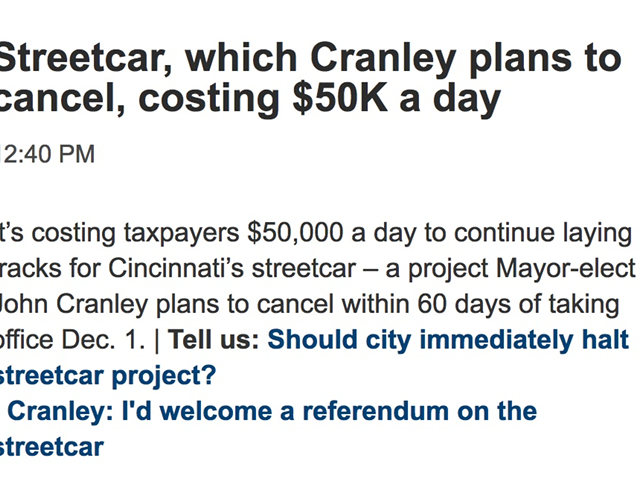Good morning all. It’s Friday. I’m ready for the weekend. You’re ready for the weekend. Let’s keep this news rundown brief today, k? Here's what I've seen floating around in the news and what I have written in my own reporter's notebook.
• The Hamilton County Board of Elections has released its report on last month’s rather rocky election day. The results, as you might expect, weren’t great. The report found that a crazy 84 percent of polling locations experienced difficulties that day. Those problems ranged from trouble with new electronic voting systems to poll worker errors and poll locations that closed earlier than the extended time ordered by a judge. The report is headed today to Ohio Secretary of State Jon Husted, who, let us remember, originally pinned voting difficulties solely on poll workers here in Hamilton County. Getting our polling situation worked out is a big deal, as Hamilton County was piloting a new voting system that will be extended to the rest of the state next year and because the county looks to be a pivotal battleground in perhaps the most important swing-state in the country for the next year’s presidential election. The BOE report recommends opening polls earlier and fixing bugs in voting software ahead of next year's elections.
• City of Cincinnati officials Wednesday unveiled a new plan to fight the city’s food deserts. The Grocery Attraction Pilot Program will provide financial incentives for the establishment of new grocery stores in neglected parts of the city and provide support for existing grocery stores in areas at risk of becoming food deserts. The federal government defines a food desert as an area where at least 20 percent of residents are below the federal poverty line and live more than a mile from a grocery store. Cincinnati has several such areas, including Avondale and tucked-away places like Millvale. Those incentives and support include tax abatements for stores that come into under-served communities and a waiver on the cost of food supply permits for five years. The city will front the cost of the permit inspection and provide faster, more flexible scheduling of those inspections for grocery stores in such areas. A proposed cooperative grocery in Northside, Apple Street Market, could be one of the stores eligible for that assistance. You can find out more about that project in our cover story about food co-ops and more about the city’s food access problem here.
• City Manager Harry Black confirmed yesterday that the city did not list the job posting seeking a replacement for ousted former Cincinnati Police Chief Jeffrey Blackwell, nor did the city interview outside of CPD for the job. Black defended that decision yesterday at a press conference announcing the hiring of interim chief Eliot Isaac as Blackwell’s permanent replacement, saying that Eliot, a 25-year veteran of CPD, is the best candidate for the job. Though many called for a national search for a replacement, Cincinnati City Council members said they supported Isaac in his new role. Council Wednesday voted to boost the pay range for the chief position from $136,000 to $163,000, though the original proposal by city administration would have put the top-level salary at $180,000. Some members of Council balked at that raise. Supporters on Council and in the city administration said that the pay bump was needed to secure Isaac as the new chief. Opponents of the raise said the city should focus on providing better wages to the city’s hourly workers. Isaac faces one more hurdle before he’s good to go as chief — he’ll need to relocate into the city limits from his home in Forest Park. He’s indicated he’s willing to do so.
• The Southwest Ohio Regional Transit Authority today held its State of Metro presentation and issued its report on the future of its bus service. Big changes for the coming year include a new transit center in Oakley, smaller buses running more routes in the city’s under-served areas and smartphone-enabled ticket buying options. The announcement that Metro will run smaller buses comes after a near-strike by the Amalgamated Transit Union, which initially balked at the suggestion because Metro wanted to use drivers who do not have commercial driver’s licenses and pay them less money than current Metro drivers. ATU and Metro reached an agreement the day before a strike vote earlier this month, and now Metro will use its regular drivers to drive the smaller buses. Officials with the bus service announced at the presentation that Metro has balanced its budget for 2016 without raising fares or reducing service.
• Finally, some county prosecutors in Ohio are resisting widespread calls to reform the state’s grand jury process, including Butler County Prosecutor Michael Gmoser. The push for reform comes after several high-profile police shootings of unarmed black men across the state, including the death of Tamir Rice in Cleveland, John Crawford III in Beavercreek and Samuel Dubose in Cincinnati. Earlier this year, Ohio Gov. John Kasich convened a task force on community-police relations made up of state lawmakers, community leaders and law enforcement professionals to study the issue. Reforms increasing transparency in the often-secretive grand jury process was among the recommendations that task force suggested. Gmoser told a state committee charged with deciding upon reforms to the grand jury process that the current process works well, and that changes will only compromise the sensitive nature of grand jury proceedings, which are secretive in order to keep from leaking information and biasing a potential trial jury.





